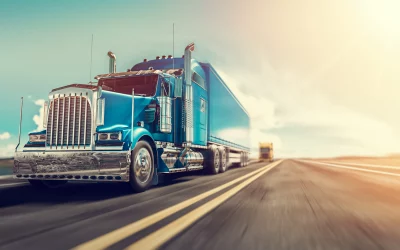Top Rated Law Firm for Truck Accidents in Colorado Springs
When a truck makes an abrupt turn, changes direction, or hits an impediment with one of its wheels, it might roll over onto its side. Due to their greater center of gravity, trucks, big vans, and SUVs are more prone to rollover than other cars.
Rollover accidents account for nearly one-fifth of all fatal car fatalities on U.S. highways, according to the National Highway Traffic Safety Administration (NHTSA).
A single erroneous move may result in a fatal truck overturn. When executing fast steering movements, truck drivers are taught to carefully consider the maneuverability, restrictions, and greater center of gravity of their cars. The trucker’s irresponsibility causes the great majority of rollover accidents involving heavy trucks.
A truck rollover accident may hurt the truck driver and other drivers, motorcyclists, bicyclists, and pedestrians in the area of the overturned car. These accidents often result in fatalities and debilitating disabilities.
Consider calling an expert Colorado Springs truck accident attorney to evaluate culpability and explore your possibilities for compensation if you or someone you know was injured in a rollover-related accident.
Rollovers in Trucks: What Causes Them?
According to research, a tractor-trailer or other large rig is likely to roll over when it makes a motion that causes the car’s or cargo’s weight to change quickly.
Rollover accidents involving trucks have a variety of causes and contributing factors, including:
Speeding — When a truck driver speeds or travels too quickly for the road or weather conditions, the chance of a rollover accident rises significantly. According to the NHTSA analysis, the likelihood of rolling over is greater on highways with stated speed limits of above 55 miles per hour.
Sudden turning or swerving
A truck that turns or swerves too rapidly to escape danger is more likely to roll over onto its side owing to a significant change in the truck’s weight or load.
Taking abrupt and sudden bends
Because of the quick change in the truck’s center of gravity, sharp curves may cause large rigs to roll over. A rollover disaster is probable if the truck driver fails to slow down while approaching a steep bend.
Driving with an overloaded trailer
There’s a reason federal cargo loading restrictions exist. A truck is more prone to flip over when the trailer is overloaded since the car is hauling more than it can bear. Driving with an overweight trailer exerts undue strain on the car’s tires and brakes, which may lead to tire blowouts and a rollover.
Shifting cargo
A truck is more prone to roll over owing to shifting freight if the goods in the trailer are not correctly loaded. When cargo loads in the trailer are uneven or inadequately loaded, the truck driver is more likely to lose control of the car and end up in a rollover disaster.
Distracted driving
A truck driver chatting on the phone or sending or reading a text message is more likely to make poor maneuvering choices that might cause the truck to roll over.
Driving when tired
Driving while tired is exactly as hazardous as driving while distracted. When driving a tractor-trailer or semi-truck, a tired truck driver may have a delayed response time and worse judgment, adding to the chance of mistakes.
Falling asleep at the wheel
When a motorist is too tired from driving for too long without stopping, they are more prone to fall asleep at the wheel and cause a rollover. Federal hours of service restrictions are intended to prevent weariness and drowsy driving, yet far too many truckers disobey the rules and continue to drive without taking the mandatory breaks.
Driving while under the influence of alcohol or drugs
Driving while intoxicated may affect a driver’s judgement, response time, motor coordination, and concentration. All of these elements might make safely driving a truck difficult. As a consequence of the trucker’s drunkenness, rollovers and other avoidable accidents are more likely to occur.
Making hazardous lane changes
When a big rig or car on the road performs an improper lane change, it is more likely to overturn. Cutting another car off, neglecting to indicate a lane change, and failing to assess blind spots while changing lanes are all instances of hazardous lane changes.
Having mechanical difficulties
Not all truck rollover accidents are caused by driver fault. Mechanical breakdowns or problems may also cause rollovers. When a truck’s braking or steering system fails, the car may roll over onto its side, particularly if the tractor-trailer or semi-truck is driving at high speeds. Drivers might lose control of their cars due to mechanical issues.
Low tire pressure
Trucks with low tire pressure might lose road grip and roll over, resulting in a rollover disaster. Tire problems may also contribute to rollovers by causing instability when speeding and turning.
Driving in severe weather
When driving on wet or slick surfaces, drivers are more likely to lose control of the car, which increases the danger of a rollover. Because fog and rain may reduce vision, a driver may fail to detect a curb, pothole, debris, or other dangers on the road, causing them to swerve or strike the obstruction with one of the truck’s wheels.
Rollover accidents may occur for various causes, including driver mistakes, technical breakdowns, and adverse weather. If you’re unsure what caused your car to roll over, talk to an expert lawyer about conducting a comprehensive investigation and determining what caused your rollover accident.
Is it Possible to Sue a Trucking Company for a Rollover Accident?
Many truck accident victims wrongly feel that they cannot hold a trucking business liable for truck rollovers because they believe the firm could not have prevented the tragedy.
Trucking rules, on the other hand, attempt to avoid or lessen the danger of truck rollovers. Both truck drivers and trucking businesses must follow these standards to protect everyone’s safety.
If you were wounded in a truck rollover accident, you might be able to sue the trucking business if your lawyer can show that the firm broke any of the following rules:
Confirming that truckers follow federal hours of service rules, which prohibit truck drivers from driving for more than 11 hours in 14 hours after at least ten consecutive hours off duty, according to the Federal Motor Carrier Safety Administration (FMCSA);
Conducting background checks and checking the qualifications and skills of drivers before hiring them;
Following these and other standards may assist in minimizing truck rollover accidents. Injured plaintiffs may sue a trucking business accountable for their injuries and damages if the firm fails to follow these guidelines and the car rolls over.
Truck Rollover Accident Injuries
In many situations, injuries sustained by passengers of motor cars in truck rollover accidents are severe and life-threatening.
Crush injuries, traumatic brain injuries, limb loss, paralysis, broken bones, and spinal cord injuries are common injuries caused by rollover accidents.
Internal bleeding and injuries
Victims may be left with impairments and may struggle to walk or work for the rest of their lives, depending on the type and severity of the damage. In truck rollovers, people who do not wear a seatbelt are more likely to die or suffer severe injuries.
According to the NHTSA data, nearly three-quarters of all car passengers killed in rollover accidents were not wearing seat belts at the time of the accident.
In a truck rollover accident, what kind of damages are available?
When a person is injured in a rollover accident, they may file an insurance claim or a lawsuit to seek compensation for their monetary and non-monetary damages:
The term “economic damages” refers to the monetary losses suffered by the aggrieved party. Medical costs, missed pay, out-of-pocket expenditures, the cost of car repairs, and other expenses are examples.
Intangible losses that are more subjective than economic losses are referred to as non-economic damages. Examples are the loss of enjoyment of life, mental discomfort, pain and suffering, and other non-monetary damages.
When seeking compensation after a truck accident, you must first understand what damages are possible in your instance and then determine the worth of your claim. A lawyer can analyze your damages and calculate a settlement price that will appropriately pay you for all of your losses based on your specific scenario.
Rollover Accidents: Frequently Asked Questions (FAQs)
Do Unfavorable Weather Conditions Play a Role in Truck Rollovers?
In bad weather, trucks and other cars with a greater center of gravity are more prone to flip over. Sleet, snow, ice, and rain are all bad weather conditions that lead to rollover accidents.
Because it is more difficult to manage a car in wet or slick conditions, a driver is more inclined to perform rapid steering and braking motions. High winds, in addition to wet and slick roads, may contribute to rollovers by causing the driver to lose control of the car.
Who is liable in the event of a truck rollover?
Rollovers are statistically more likely to result in a fatality than other forms of truck accidents. As a result, it’s critical to hold all responsible parties accountable for their reckless behavior and inability to avoid a rollover.
The facts of the event determine who is responsible for a truck rollover. The following parties may be held accountable for the accident, depending on what caused it:
- The truck driver
- Another driver
- The owner of the car that turned over
- The trucking firm
- The company in charge of cargo shipment or loading
- The company in charge of car maintenance
In all truck accident cases, even those involving rollovers, the blame theory that provides the foundation of responsibility is negligence. To assess culpability in your specific situation, consult with an expert attorney.
What Proof Do You Need in a Truck Rollover Accident to Prove Fault?
The availability of evidence in your case determines the strength of your case following a truck rollover accident. If you were injured in a truck rollover, you should collect as much evidence as possible to establish guilt and get the compensation you deserve.
- The police report is one of the most important pieces of evidence in a rollover accident.
- Your medical records
- The truck’s black box data
- The driver’s logbooks
- The car’s maintenance records
- Information about cargo weight and loading
- Photos from the crash scene
- Witness testimony
- Video footage showing the moment of the rollover
- Your medical records
- The truck’s black box data
- The driver’s logbooks
- The car’s maintenance records
- Information about cargo weight and loading
A skilled lawyer may gather these and other pieces of evidence during a comprehensive inquiry. Consider hiring an attorney to assist you in gathering all relevant information and convincingly presenting your case to the insurance company, court, or jury.
Is it Necessary to Hire a Truck Rollover Attorney?
Colorado Springs Truck Accident Attorney Jeremy D. Earle, JD
While not every truck accident case needs the assistance of a lawyer, those involving catastrophic injuries, fatalities, and/or many culpable parties do. A competent lawyer can assist an injured person in obtaining compensation for their losses and damages by conducting a thorough investigation, gathering evidence, identifying accountable parties, and securing a reasonable settlement on their behalf.
After a truck rollover accident, a skilled Colorado Springs truck accident lawyer can help you establish a compelling case, preserve evidence, and defend your legal rights.
Warrior Car Accident Lawyers
1902 W. Colorado Ave., Suite 100
Colorado Springs, CO 80904







